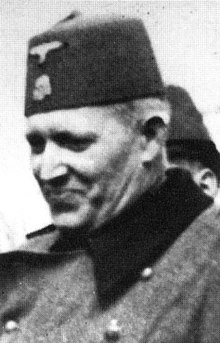Desiderius Hampel
Desiderius Hampel (20 January 1895 – 11 January 1981) was a SS-Brigadeführer und Generalmajor der Waffen-SS during World War II who commanded the 13th Waffen Mountain Division of the SS Handschar (1st Croatian) and was possibly awarded the Knight's Cross of the Iron Cross (Ritterkreuz), the highest award in the military and paramilitary forces of Nazi Germany during World War II. After the war the Yugoslavian government asked for his extradition to charge him with war crimes, but he managed to escape from a British internment camp.
Desiderius Hampel was born 20 January 1895 in the town of Sisak, Austria-Hungary (modern-day Croatia), to Volksdeutsche (ethnic German) parents. His father was an inspector on the Imperial-Royal Austrian State Railways, and the family often had to move around the Austro-Hungarian Empire. This had the benefit of teaching the young Hampel a number of languages. After he completed his primary school education, he was sent to a military school in Karlovac. After graduation he joined the army in October 1914, as a warrant officer in the 16th Hungarian Infantry Regiment Freiherr von Giesl, and in December was sent to the front line.
In April 1915, he was given command of a platoon and shortly after promoted to Leutnant and given command of the 14th Company. At the end of the year he was sent on a heavy machine gun training course at Bruck an der Leitha. When he returned to the front in November he was given command of the 4th Company of his regiment and was promoted to Oberleutnant in May 1917. In September 1918, he was appointed as the second in command of the 36th Battalion fighting in Serbia until the end of the war when he became a prisoner of war in Serbia. He escaped from captivity just over a year later and made his way to Vienna and then Budapest.
...
Wikipedia

